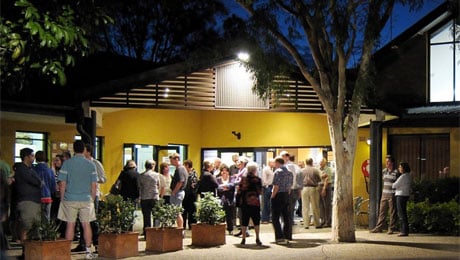
Almost every church planter will have to face the issue of whether or not to move from renting or borrowing Church facilities to becoming owners. Shifting to facility ownership is such a massive task, the sooner the issue is addressed, resolved and acted on, the more likely a new church can move seamlessly into this new phase of life in a way that doesn’t distract from gospel work. This assumes of course that owning facilities will best serve the cause of the gospel in a particular planting situation.
We have two things working against us in assessing the wisdom of facility ownership. The first is that most of us when we plant are so totally absorbed in the more relational activities of preaching the word, evangelizing every contact we can find, nurturing every believer who comes near us that we have little spare capacity to turn our minds to the more practical issues of housing the work long term. The second issue working against us is that many of us – and many of our congregation members – have had such negative experiences of owning church facilities in the past that we have become programed to see them as a great hindrance. In fact congregation members may have joined us because we didn’t own facilities. Many people have lived through ministry life so shackled to old, unattractive, impractical and even heritage listed buildings that for them it is easy to imagine the grass is somehow greener on the other side of property ownership. For some the great ideal is to get involved in a ministry that can focus on people work and not property, or invest all its money into ministry instead of buildings.
However, as someone who has run church in school halls, progress halls, surf clubs, community centres, Rotary clubs, RSL clubs, and even a shed I can say with some authority the grass isn’t greener on the other side! And importantly, it’ never the case that we only focus time and money on people, not property.
Taking a step back
In Australia it is an obvious truism that churches need a building to meet in. If we lived in a place where it never rained and the temperatures were always mild we could have regular meetings as God’ people outdoors under a tree. But when the weather is less predicable a group of people need to meet somewhere with a roof over their heads.
So, whether we like it or not, someone needs to build a facility for church to meet in. Ultimately it isn’t so much a question of whether to build or not, or even whether or not a church should spend money on property. But rather it’ a question of who pays for it and how because one way or another church must necessarily spend money on property.
Take house churches for example. For many this is the ultimate in unencumbered church life. No bills to pay. No property to maintain. All their money goes on people work – or so it is claimed. The reality however, is that someone is paying for the facility the home they meet in – and it is usually a very high price proportional to the size of the church. In one sense this is an efficient use of resource since the same facility has multiple uses. But, if the church grows then the number of possible lounge rooms available for church to meet in shrinks and soon one family is bearing the property cost of church life all on their own.
Churches always carry property costs
We began in a lounge room. But very quickly it became obvious that there was a great deal of growth we were missing out on because the only ones who felt comfortable to come to our meetings were those personally connected with the hosts. To broaden our reach we moved into a room in a local school, and soon after we moved into the school’ main meeting hall the classic basket ball court come assembly hall. Each of these moves had cost implications. After only a couple of months our church was spending money on property. And with set up and pack down we were spending a lot of time on property as well.
Once we came to terms with this reality we were better able to ask the right questions if we have to spend money and time on property, is this the best way to use our property dollars and hours? Could there be a more effective way to use our property resources that might not only facilitate greater gospel ministry but also help to secure the work of the gospel for years to come?
In the end, it became very clear in our situation that spending our property dollars on renting facilities was not only hindering our ability to grow but it was increasing the vulnerability of the valuable work God was building in and through us.
Six reasons why
We were always vulnerable to our landlords. We were twelve years in the same school hall for our main Sunday meetings (and Friday night youth groups). But on occasion the school would ask us not to use the halls sometimes for a few weeks at a time. There were repairs they needed to do or other events they just had to run. And so we were left out on the street sometimes literally! After a time there were no halls large enough to house our work so we would meet outdoors praying for clear skies. After twelive years the school asked us to leave permanently. They needed to redevelop their facilities and wanted to focus on sport over the weekends. We didn’t fit that plan.
By God’ grace we were able to secure the only other facility in our region large enough for our church, but only on a four month lease! They extended but the point was powerfully driven home. As renters we were entirely at the mercy of landlords.
Perhaps it is possible to minimise some of these control issues with carefully worded lease agreements. But very few public halls are happy with long term weekly leases and more and more public schools are closing their doors to churches. Public halls are drying up. Warehouses can be a good option but leasing is not always simple and clear cut. Parking is an issue with local council regulations. And it is naïve to imagine that when the lease comes due all will be plain sailing into a new agreement.
Obviously related to the above is the problem of permanence and stability.
We were looking to build a work that would not only grow but impact generations of people. We have always considered the minimum goal to think out into three generations my children’ children. That means thinking about the work over the next 70yrs. Will renting provide the appropriate and most helpful platform for a growing work over that length of time?
In our case, by God’ grace, we were seeing significant fruit and growth. Where would we take this work if the publically available halls were closed to us- as they were becoming? Some suggested that we could simply break church down into smaller church groups that would fit into whatever public spaces were available. Now, again, no doubt God will build his church, and if we had to we could have proceeded down that line. But the simple fact was that if we broke church down into smaller congregations not all of them would survive. Some would. Some would grow again – but then strike the same problem! They would need facilities to suit their work.
All of our ministries have been restricted by renting facilities. Our youth work and women’ ministry have been hardest hit. No doubt every facility has its point of capacity. However, we were hitting capacity constraints more quickly because we were required to share every facility we rented with other community renters. So our women’ Bible study group work was growing but could only find two slots in the local community centre to rent because of all the other activities happening at that location often very tiny groups that met infrequently but still locked up a time slot.
We got to the stage with our youth groups that parents were dropping kids off at three different places! Even the senior minister was getting jack of taking his kids to youth group! How much more the fringe person?
This was always a headache, but in the last few years we resorted to buying a large truck which stored every stick of equipment required to run our church meetings. Every Sunday morning at 6am a team of people would take this truck to whatever hall we were meeting in and unload all the equipment, set everything up, tune it all in and then at 9:30 PM that evening back the truck up and pack everything away again. This meant our equipment deteriorated much more quickly. People deteriorated more quickly too and it was a constant challenge to ensure the sound quality and look and feel of our space was good. Every week we started from scratch.
As we grew there was a corresponding complexity in our ministries that meant managing multiple venues was more and more difficult. A great deal of time and energy (and heart ache) was spent on coordinating, communicating and managing. People often struggled to remember where the next program was. Then there were the irregular events. Where was a funeral, a wedding, an AGM going to be held? In the end we simply ran out of halls.
No doubt our identity ought to come from our union with Christ through the gospel. And our identity as a people is in our gathering together, whereever it gathers. But there is something about our humanity that finds helps in more physical things.
This was particularly an issue for those we were seeking to win to Christ. A group that has no permanent physical home in an area feels to many like a fly-by-night cult. In evangelism we were often met with the question about who we were, where we met, what kind of group we were and so on. No doubt the early church overcame these to grow and we certainly saw God bless us despite all this. However, a number of warmly interested people responded to our evangelism by drifting to churches that presented a more stable and settled place in our community’ life. Praise God they went somewhere. But their leaving expressed a concern that was impossible to ignore.
We estimated our annual cost at around $90,000 on hall rentals, and property management. This is without factoring in wear and tear. Without owning property we were still spending a lot of money on property!
Since we were spending money on facilities anyway, why not spend it more effectively and efficiently by moving from renters to owners.
This is where we now are.
Very early on in church life we began planning to establish our own facilities. We set ourselves to spend around 15% of our income on property each year. So in our first couple of years we bought a house that matched our ability to repay. This functioned as our office as well as a forced savings plan. Churches find it far easier to budget thousands of dollars a year to repay a loan than they do building a cash surplus. Surpluses so often kill the nerve of sacrificial giving. But mortgage repayments? Makes good sense. For us it became the means by which we built equity. We eventually sold the house at a profit to provide a deposit for a five acre block of land which cost us two million dollars. In December 2009 we moved on to that block of land and into facilities purpose-built to house our church and its ministries. Our aim was that they might work to enhance our ministries and facilitate their growth.
By God’ grace they have done just that.
The outcome
Here is another irony. The credo 'money on people not property' OR 'invest in ministry not buildings' has much to commend it … so far as it goes. We have spent significant money on property and buildings. But it is having a massive impact on people!
In our first month we have grown in weekend attendances by around 20-30%. This is a very crass analysis but the money we spent on property has actually had a direct impact on our people ministries. No doubt this is because we have been in a start up position and so able to build something from scratch without the restraints of heritage listings or monuments to the misguided 1970′.
Beyond that, though, it makes the point that there is no necessary divide between people money and property money. Our facilities have actually triggered significant growth. We are very aware of the great need to capture that growth and minister in such a way that these new people learn of Christ and are drawn past the initial attraction to actually know the living God and loving and serving him. But we have a far larger audience with which to do this work than we previously had.
Further, it has not only opened up for us ministry opportunities we didn’t have before, it has also enabled us to become a property giver in our community instead of a property user. In addition, it has given us a focus and a hub from which to reach out. It has created a public profile which adds to and reinforces the profile we have gained by personal relationships. It has effectively created a background noise which is enhancing personal witness.
Should church plants buy their own facilities?
Certainly not always; every planter needs to read their situation. There will no doubt be some contexts and situations where this will be either impossible (humanly speaking) or counter productive to winning the lost. But in the vast majority of plants, there will come a time when moving from renting to ownership will serve the cause of the gospel and not hinder it.
Such is the expectation that a church plant ought to eventually provide its own facilities that it is wise to settle this question early on and provide for this almost inevitable reality by planning to fund a property purchase.
One helpful principle we used was the tithe. It was very obvious in our church that the vast majority of people had resolved the rent vs buy question at least as regards their own family situation! They were all home owners. So we put it to people that they consider tithing their home mortgage for the purpose of establishing a church home. If everyone did this we could buy a church facility many times over.
This enabled people to also get past the naïve nonsense that it is wrong to tie so much money up in property. How often is this charge laid on churches by people who themselves are mortgaged to the hilt to build their own large palace to house only one family for 30 years? So many of us have already decidet that 'rent money is dead money' and so bought our own family homes. It is not a large step to see the wisdom of providing a facility that will serve not only one family but hundreds of families for generations to come at a massively smaller per family cost than the family home.
In some locations that will mean looking for acreage. In others it will mean looking for a warehouse or a shopping complex or an old picture theatre that can be fitted out to suit. Perhaps the first is the best option for the edges of the metropolitan sprawl and country regions. The second seems best within more densely populated areas. We seriously explored buying a warehouse and fitting it out. The greatest difficulty with this option was parking requirements from the local council.
In some regions it might mean entering into an arrangement with another business or group to share facilities. Typically though, long term, churches can offer a greater impact if they develop their own facilities that enhance what they do and provide a central hub from which ministries can grow and flourish.
As far as the cost involved in such a move, it is important to look past the total expenditure and see it as a per person cost. The larger the church, obviously, the larger the gross cost. But in our case, although the gross cost was great, the per person cost was far smaller relative to many other smaller churches who had redeveloped property.
And further, people are far more ready to give to property, properly conceived and clearly serving an appropriate vision than most of us give them credit for. The money is there! Learning to ask for it in ways that honour Christ is critical in any church planter’ ministry life.
It is certainly all about Christ. But there is much that builds a platform to preach him and minister to people. Building is one such thing.

